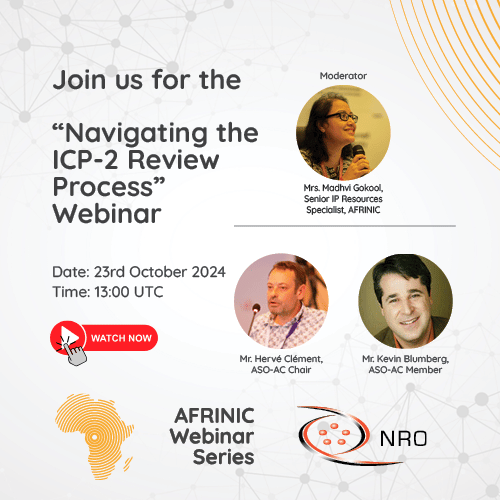AFRINIC approaches IPv4 Exhaustion, Soft-landing Phase 2
- Posted By Webmaster
- Published On -
- Hits: 18335
 AFRINIC's available IPv4 resource pool is gradually decreasing. AFRINIC has been delegating IPv4 resources to its Resource Members who have demonstrated needs according to IPv4 Exhaustion Phase 1 of the soft landing policy. As we approach Phase 2 of the Exhaustion phase, we would like to seize this opportunity to keep our membership aware of the coming changes and implications.
AFRINIC's available IPv4 resource pool is gradually decreasing. AFRINIC has been delegating IPv4 resources to its Resource Members who have demonstrated needs according to IPv4 Exhaustion Phase 1 of the soft landing policy. As we approach Phase 2 of the Exhaustion phase, we would like to seize this opportunity to keep our membership aware of the coming changes and implications.
AFRINIC's available inventory of IPv4 space is updated daily and is summarised at https://afrinic.net/stats/ipv4-pool. Here is an update on the implementation of the IPv4 Soft Landing policy as per Section 5.4 of the Consolidated Policy Manual.
Soft Landing Policy
In 2011, "IPv4 Soft Landing" policy to deal with the exhaustion of IPv4 address space was proposed, discussed and reached agreed. The policy is currently described in Section 5.4 of the Consolidated Policy Manual - see https://afrinic.net/policy/manual#Soft-Landing. (It was earlier known under the identifier "AFPUB-2010-v4-005").
The soft landing policy defines the phases for the exhaustion of the IPv4 address space: the "Current Phase", "Exhaustion Phase 1", and "Exhaustion Phase 2". These phases begin and end according to criteria defined in the policy. These criteria are based on the amount of address space remaining in AFRINIC's IPv4 pool.
Final /8
The following definition of the "Final /8" appears in section 5.4.1 of the CPM:
The Final /8 block of IPv4 address space, or "Final /8", is the /8 block of IPv4 address space that has been allocated by the IANA to AFRINIC in terms of section 2.2 C of the Global Policy for the Allocation of the Remaining IPv4 Address Space at the time of exhaustion of the IANA pool of IPv4 address space. Based on that definition, the "Final /8" is the IPv4 address block 102.0.0.0/8, which was allocated by the IANA to AFRINIC on 3 February 2011 (NRO news article) (AFRINIC news article).
Criteria for the Start of Exhaustion Phase 2
Section 5.4.3.1 of the CPM specifies the following criteria for the end of Phase 1 and the start of Exhaustion Phase 2:
"Allocations and assignments will be made from the Final /8 or from any other IPv4 address space available to AFRINIC until no more than a /11 of non-reserved space is available in the Final /8. At this point, the Exhaustion Phase 2 will begin. For the avoidance of doubt, all applications that are still under evaluation at this point will be evaluated as per the new clause."
AFRINIC will implement the specified criteria as follows.
- Exhaustion Phase 1 ends and Exhaustion Phase 2 begins when AFRINIC has no more than one /11 of non-reserved IPv4 space available in the final /8. (CPM section 5.4.3.1.) The policy does not specify whether the /11 must be contiguous, or may be made up of multiple smaller blocks adding up to the same amount of space.
- AFRINIC's interpretation is that the /11 may be made up of multiple smaller blocks. Accordingly, Exhaustion Phase 2 will begin when the available non-reserved space in the final /8 is no more than 2,097,152 IP addresses (the equivalent of a /11), regardless of how the available addresses are arranged in contiguous or discontiguous blocks. Nevertheless, AFRINIC will endeavour to keep a contiguous /11 set aside for as long as reasonably feasible.
Changes in Exhaustion Phase 2
When Exhaustion Phase 2 begins, most of the clauses from Exhaustion Phase 1 continue to apply, but the following changes will take effect:
- Minimum IPv4 Allocation or Assignment shall be /24. (CPM section 5.4.3.2.)
- Maximum IPv4 Allocation or Assignment shall be /22. (CPM section 5.4.3.2.)
The following considerations from Exhaustion Phase 1 will continue to apply in Exhaustion Phase 2:
- No explicit limit on the number of times an organisation may request additional IPv4 space. (CPM section 5.4.4.)
- Allocation/Assignment period (planning window) is 8 months. (CPM section 5.4.5.)
- Existing Resource Members are eligible to get additional blocks if 90% efficient usage of all resources has been demonstrated. (CPM section 5.4.6.1.)
- Use of AFRINIC IPv4 resources outside the AFRINIC service region should be solely in support of connectivity back to the AFRINIC region. (CPM section 5.4.6.2.)
Operational
AFRINIC encourages all its Resource Members to ensure policy compliance and submit their resource requests with complete information.
Future Information
AFRINIC will issue another communique when Exhaustion Phase 2 appears to be imminent.
More information
- Related news: IPv4 exhaustion: www.afrinic.net/exhaustion
- AFRINIC's Policy Development Process (PDP): https://afrinic.net/policy
- Global Policy for the Allocation of the Remaining IPv4 Address Space: www.icann.org/resources/pages/remaining-ipv4-2012-02-25-en




 As part of our ongoing effort to improve our services, we invited you to participate in the 2018 AFRINIC Customer Satisfaction Survey (CSS) from 05 October 2018 to 15 February 2019. The study was conducted with the following objectives in mind:
As part of our ongoing effort to improve our services, we invited you to participate in the 2018 AFRINIC Customer Satisfaction Survey (CSS) from 05 October 2018 to 15 February 2019. The study was conducted with the following objectives in mind:

